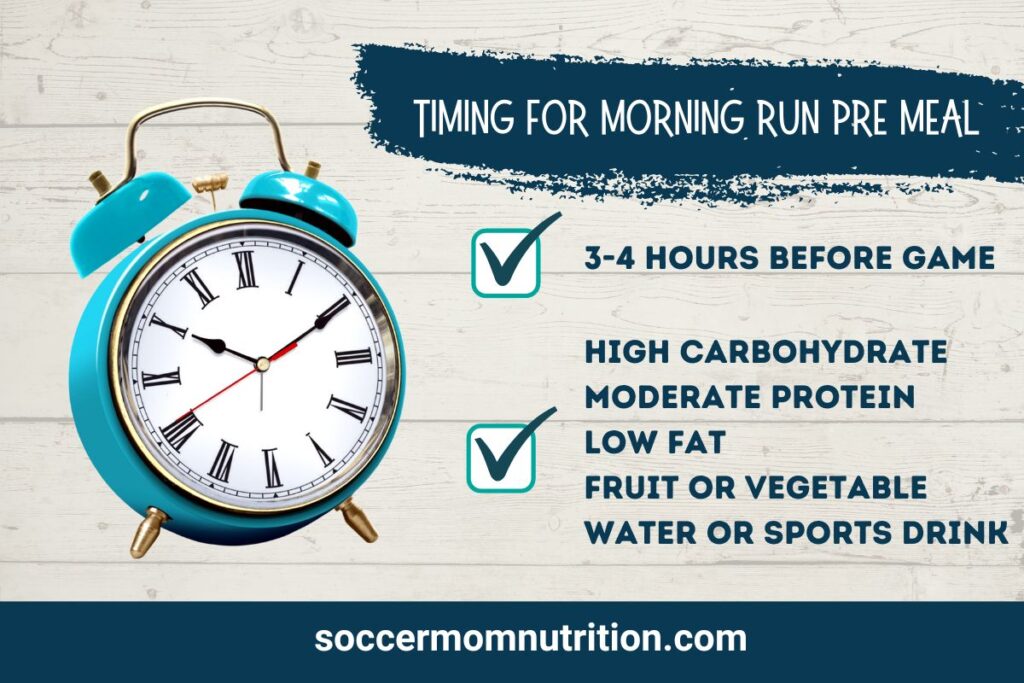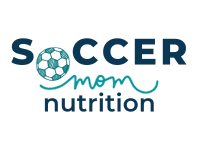What to Eat Before a Morning Run: Fueling Tips
Are you an early bird runner who likes to hit the road before the sun rises during the offseason or a non practice day? If so, you know the importance of fueling your body with the right foods before heading out for a run.
Knowing what to eat before a morning run can have a significant impact on your performance and overall energy levels.
In this post we’ll discuss the timing of meals, types of foods to eat, specific food recommendations and what to avoid before a morning run.

Timing of Meals Before a Morning Run
Timing is everything when it comes to fueling before a morning run. Generally it’s not recommended that you run on an empty stomach since this can impact your energy, focus and stamina.
You should eat breakfast before a morning run, especially if it’s a run lasting over an hour. Eating even a little bit of food can help provide quick energy to stabilize blood sugar and resupply your muscle energy stores that empty overnight.
Skipping breakfast has been shown to negatively impact exercise performance throughout the day. (1)
You want to give your body enough time to digest your food before hitting the pavement, but not so much time that you feel hungry or sluggish during your run.
Generally, it’s best to eat a meal or snack 1-3 hours before running. However, the exact timing and amount of food varies based on individual preferences and your energy needs based on your sports nutrition plan.
Experiment with different timing, types and amounts of foods to find what works best for you. However if you find you cannot eat anything before a run, opt for a sports drink that can top off energy stores.
Additionally, if you can’t eat before your run, fuel up on a high carb dinner the night before. And make sure to eat a bedtime snack.

Types of Foods to Eat Before a Morning Run
The foods you eat before a morning run should provide you with the energy and nutrients you need to sustain your run. Here are the three primary macronutrients to consider:
Carbohydrates
Carbs are your body’s primary source of energy. Eating carbs before a morning run can help you maintain your energy levels throughout your run.
The more time you have to digest before your run, the more you want to choose complex carbohydrates such as whole grains, fruits and vegetables, which are digested more slowly and provide sustained energy.
If you’ve only got 30-60 minutes before your run, you’ll want to choose quick digesting carbohydrates such as:
- Oatmeal
- Baked potato or sweet potato
- White rice
- Dry cereal
- Fig bars
- Pancakes
- Bagel with cream cheese
- Whole grain toast and jam
- Granola bars
- Applesauce
- Whole grain crackers, animal crackers
- Peanut butter and jelly sandwich
- Pretzels
- Dried fruit
- Whole wheat english muffin with jam
- Cliff bar
Also, if you’re gluten free, there are plenty of gluten free carbs that can also fuel your energy stores.
Protein
Protein is essential for muscle repair and recovery. Eating protein before a run may help reduce muscle damage and help immune function. (2)
Choose lean protein sources such as eggs, low fat greek yogurt, gluten free protein bars and nut butter.
Healthy fats
Fats are a secondary source of energy and can help you sustain your energy levels during a longer run, especially when muscle stores are empty and no additional carbohydrates have been eaten.
Choose healthy fats such as avocado, nuts and seeds. However, as you get closer to your run, you’ll want to avoid high fat foods and stick to easy to digest carbs.
Hydration before a run
Hydration is also essential for a morning run. Make sure to drink plenty of water before and during your run to avoid dehydration.
Depending on the length of your run, you may want to have a sports drink on hand since they are effective at topping off fuel stores, rehydrating and replacing electrolytes lost when you seat.
Breakfast recommendations
Now that you know the types of nutrients to look for before a morning run, here are some specific food recommendations:
- Pre-run meal: When you have at least 3 hours before a run, you may want to eat a more substantial breakfast. A balanced breakfast that’s high in complex carbs, moderate in protein and lower in healthy fats is a great option for a morning run.
Some examples include oatmeal with fruit and nuts, pancakes with nut butter and berries, avocado whole-grain toast with eggs or a smoothie with berries, protein powder and spinach. Check out our 25 breakfast ideas for more inspiration.
- Pre-run snack: The closer you get to your running time, the more you’ll want to choose easy to digest carbohydrates. If you’re short on time, a small snack can provide the energy you need to sustain a shorter run.
Some examples include a banana with nut butter, low fat greek yogurt with granola, dry cereal with dried fruit, toast and jam, toasted bagel and cream cheese.
- Vegan/vegetarian options: Vegan and vegetarian runners can also fuel up with a plant based balanced meal or snack.
When you have time to digest these are examples: a tofu scramble with veggies, a quinoa bowl with roasted veggies and avocado or a smoothie with almond milk, frozen fruit and chia seeds.
Otherwise you should follow the recommendations above for quick digesting carbohydrates.
Tips for avoiding gastrointestinal distress while running
No one wants to experience gastrointestinal distress while running. To avoid this, try the following tips:
- Avoid high-fiber, high-fat and high-protein foods before a run
- Avoid caffeine which can cause dehydration and may cause you to need to poop
- Experiment with different foods to find what works best for you
- Keep up with your fueling needs throughout the week so that you can keep your energy stores fueled
Recovery after your morning run
Make sure that after you finish your run, you eat an adequate meal and snacks to help your recovery so that you’re ready for the next game, practice or run.
Wrap up
Fueling your body before a morning run is essential for maintaining energy levels and avoiding gastrointestinal distress.
Be sure to give yourself enough time to eat something so that you can fill or top off your glycogen stores. And have enough time to digest your food before running and choose foods that provide a balance of carbs, protein and healthy fats.
With the training plans and right fuel, you’ll be ready to tackle any morning run with ease. You may want to consult a registered dietitian to help you develop an individual plan.
Join our mailing list and get our FREE Pre-Activity Fueling Guide.
Stephanie Magill, MS, RD, CD, FAND has over 22 years of experience in public health and nutrition. As a performance registered dietitian nutritionist, Stephanie specializes in sports nutrition and provides simple and actionable information so that athletes can be well fueled for high performance on and off the field. Stephanie has a Master’s Degree in Nutrition and is a Fellow of the Academy of Nutrition and Dietetics.

